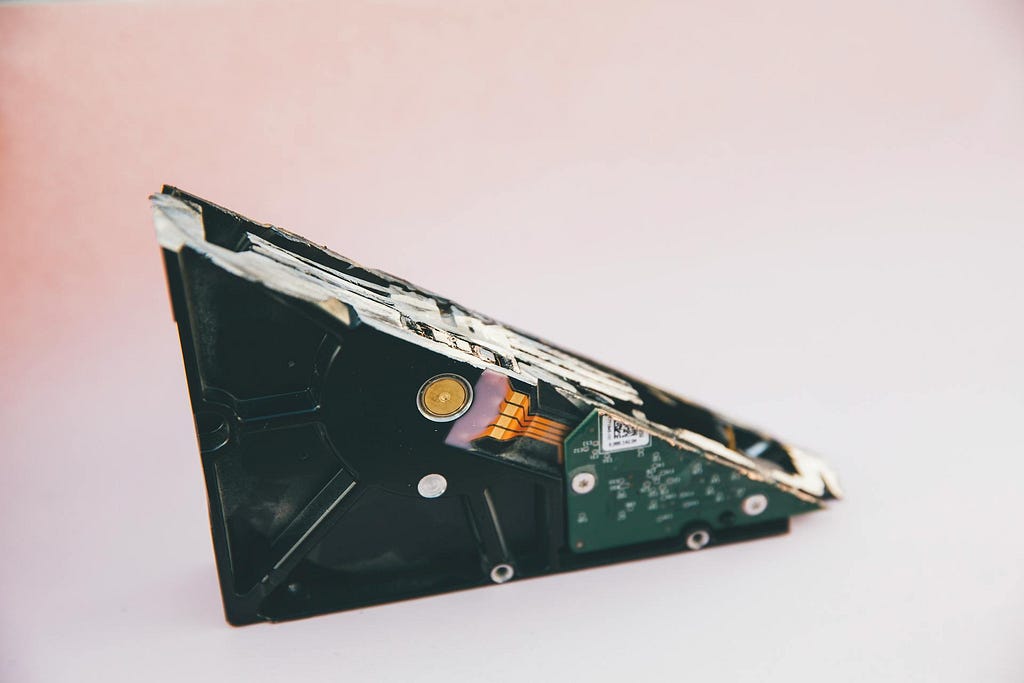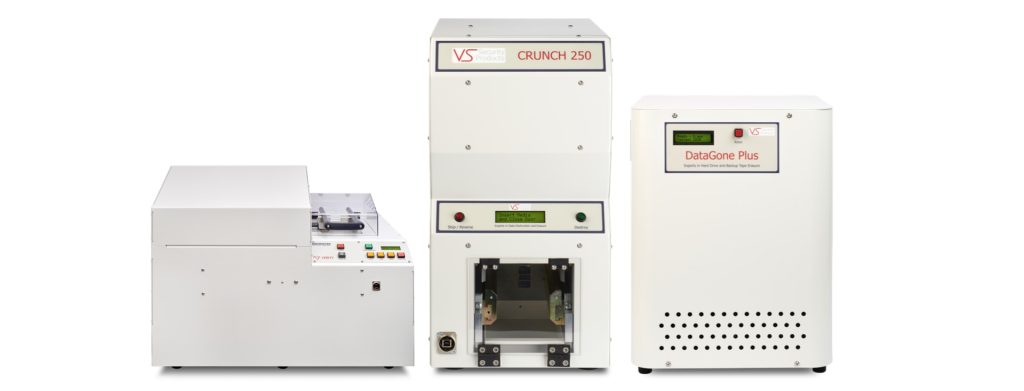Top 19 Questions About SSD Shredding: The Shredder Knowledge Guide

Solid-state drives (SSDs) are rapidly replacing traditional hard disk drives (HDDs) due to their speed and reliability. However, securely disposing of SSDs requires different methods compared to HDDs. Shredding is a popular option, but it raises many questions.
Here are the top 19 most common questions about SSD shredding answered:
- Why can’t I just delete files on an SSD for secure disposal?
- Deleting files on an SSD doesn’t guarantee complete erasure. Data can still be recovered using specialized software.
- Why is shredding recommended for SSDs?
- Shredding physically destroys the SSD, making data recovery virtually impossible.
- What type of shredder can shred SSDs?
- Industrial-grade shredders designed specifically for data destruction are required for SSDs such as the MediaGone 500.
- Is there a difference between shredding an SSD and a mechanical hard drive?
- Yes. SSDs and HDDs are designed differently and therefore, depending on whether you have a mechnical hard drive or a solid state hard drive, you need to use the approriate descruction method for each. For SSDs, this is shredding, and for HDDs, this is degaussing and/or destruction using a hard drive crusher such as the Crunch 250.
- How small do the shreds need to be for secure SSD disposal?
- Shred size recommendations vary depending on regulations and security requirements. Generally, particle sizes of 4mm or less is recommended.
- Is there a software component to SSD shredding?
- While shredding is the primary method, some shredders like the MediaGone 500 integrate data auditing software.
- Can I shred a laptop with an SSD inside?
- Industrial shredders can handle entire laptops, but some require removing the SSD beforehand. Check the shredder’s specifications.
- Does shredding damage the physical components of the SSD?
- Yes, shredding completely destroys the SSD, rendering it unusable.
- Is SSD shredding eco-friendly?
- The shredded SSD components can often be recycled by responsible e-waste disposal companies.
- How can I be sure an SSD is completely shredded?
- Reputable shredding companies can offer certificates of destruction that document the shredding process.
- Who needs to shred SSDs securely?
- Businesses, government agencies, and anyone handling sensitive data on SSDs should prioritize secure shredding.
- Are there any data privacy regulations that mandate SSD shredding?
- Some data privacy regulations, like GDPR, require organizations to implement appropriate technical measures for data erasure. Shredding can be a way to comply. In the US, there are more than 30 data laws at a state level that also mandate a certain level of data erasure where shredding can facilitate the secure destruction of information stored on SSDs.
- How much does it cost to shred an SSD?
- Costs vary depending on the shredding company, volume of SSDs, and desired level of service. Mobile shredding companies or in-house shredding can be cost-effective depending on the number of drives you have.
- Can I shred SSDs myself at home?
- Industrial-grade shredders are required to phsyically shred an SSD. The Mediagone 500 for example can be used at home as it works on a standard socket, however this may be overkill for an individual user with a small number of drives. It is however not advisable to attempt shredding an SSD with anything other than a certified shredder machine as this poses safety risks.
- What happens to the shredded SSD particles?
- Responsible shredding companies can recycle the shredded materials whenever possible.
- Are there any security risks associated with transporting SSDs for shredding?
- Yes. Ensure proper data security measures are taken during transportation, such as using secure containers.
- How can I find a reputable SSD shredding company?
- Look for companies certified by data destruction organizations and those offering certificates of destruction or order an industrial-grade shredder that handles SSDs.
- What questions should I ask a shredding company before using their services?
- Ask about shred size capabilities, data auditing options, security protocols during transportation, and best practices. Also enquire about lead times for delivery as shredders can sometimes take several weeks to ship due to their size.
- Is there a future for secure SSD disposal methods beyond shredding?
- Research is ongoing for advanced data erasure techniques specifically for SSDs. However, shredding remains the most reliable method for now.
If you are considering SSD shredding for your organization, contact us to learn more about the most suitable data destruction solution: [email protected]
Photo Credit: Markus Spiske

